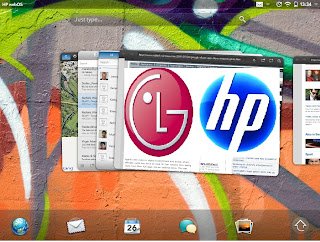The Past
I used to be a Palm OS guy. Owned several devices over the years. Anyone who knows Palm history well enough, knows they did very little to modernize the Palm OS, and lost their grip on the smartphone world to the likes of RIM, Apple, and Google with their respective OSes.
I'm a fan of hardware and software being made by the same vendor. I thought about an iPhone back when it was first released, but they were locked in with AT&T, and I was locked in with Sprint. I didn't want a BlackBerry. Just never grabbed me with all the menus and trackball. Palm tried to make a comeback with webOS. I was standing on line day 1 waiting for this new chapter in Palm's life. Those were happy times. Really thought webOS was going places.
Then Sprint turned its back on Palm, and wouldn't pick up any new webOS devices. I was crushed. I didn't want to switch carriers, but I wanted new, advanced hardware.
That summer, Sprint introduced the original HTC EVO. I took a dive and discovered Android. It wasn't as elegant as webOS when it came to multitasking and gestures, but between the hardware and the app selection, I was sold.
The Present
Almost 3 years later, and 3 Android devices later, I'm an Android fan. Maybe not fanboy status since I'm writing this, but definitely a big user of Google products: Google+, Voice, GMAIL, Calendar, Maps, Chrome, Drive, GTalk, etc, etc. Three years into the ecosystem, and you could say I'm pretty locked in. Or not. There's still something missing in my Android experience even after almost 3 years.
A lot of the things that make Android great also work against it. Openness, customizations, cutting edge, and choice are all hallmarks of the platform. They also bring inconsistencies at almost every level of the experience. Depending on what version of the OS, which hardware vendor, and which carrier, your Android mileage may vary. While the Nexus program/brand might be the future for Google to bring some consistency to the Android customer experience, it's not a one size fits all solution for everyone. For example, only one carrier in the U.S. has the latest iteration of Google's Nexus smartphone as of this writing.
So given my dissatisfaction with the disjointed experience one sometimes gets with Android, you would probably think I'd be headed towards iOS now that it is available on my carrier. However, I have owned an iOS device. An iPad 2. After a year of use, and running it side by side with Android Ice Cream Sandwich on my dual-booted HP TouchPad, I realized iOS just didn't work the way I worked. Just didn't have the same flow. Speaking of flow…
The new re-designed, re-engineered, re-invented BlackBerry 10 has been on a tear in the news lately. Admittedly, a year ago when there were rumblings of a comeback, I was truly skeptical. However, all of the recent image leaks, specs, talks about major carrier support, number of apps that will be available, and videos showing off the gestures and integration supported, have had me really intrigued. RIM also makes the software and hardware, something I've always been biased towards. From what I can tell, RIM has developers fired up and aims to market the hell out of the platform. Also the BlackBerry, like the iPhone, is iconic and has its own mystique amongst its fans. Even though I was never part of that collective, I was, however, a webOS fan. I can see some of the similarities between RIM's attempt at a revival and Palm's. On that note…
The Future
Recently, RIM's CEO, Thorsten Heins,
told the media he would be open to selling off the hardware unit, and licensing the BlackBerry OS. That sort of talk gives me flashbacks of Palm, and I would hope Mr. Heins would look back in the not too distant past to see how that worked out for Palm. It makes me uneasy to think about jumping into the BlackBerry World if they are unsure about what direction they want to take the company long term.
My other concern with RIM is how long it's actually taken them to arrive at this point. To be on par with iOS and Android. Can they innovate rapidly going forward, or will they end up like Palm?
There's also the fact that I use so many Google apps, and so do millions of others. Will Google provide a level of support with applications for the new BlackBerry platform as it has with iOS, or see it has a threat to Android? Even if Google doesn't see BlackBerry 10 as a threat to Android, because of a smaller user base, will it think it's worth developing for? Maybe. If all the other big names are there it might follow. Or it could ignore BlackBerry, essentially crippling the platform, since Google apps are some of the most widely utilized apps. Just check the iOS App Store for most popular apps downloaded and many of Google's apps are listed.
In reality it's not life or death. I could try out BlackBerry 10 for a while and love it. I could also hate it, just rejoin the legion of Android users, and hope Android gets its act together by then. Either way, the industry's future looks a bit brighter now that there actually may be other viable choices on the horizon.






















